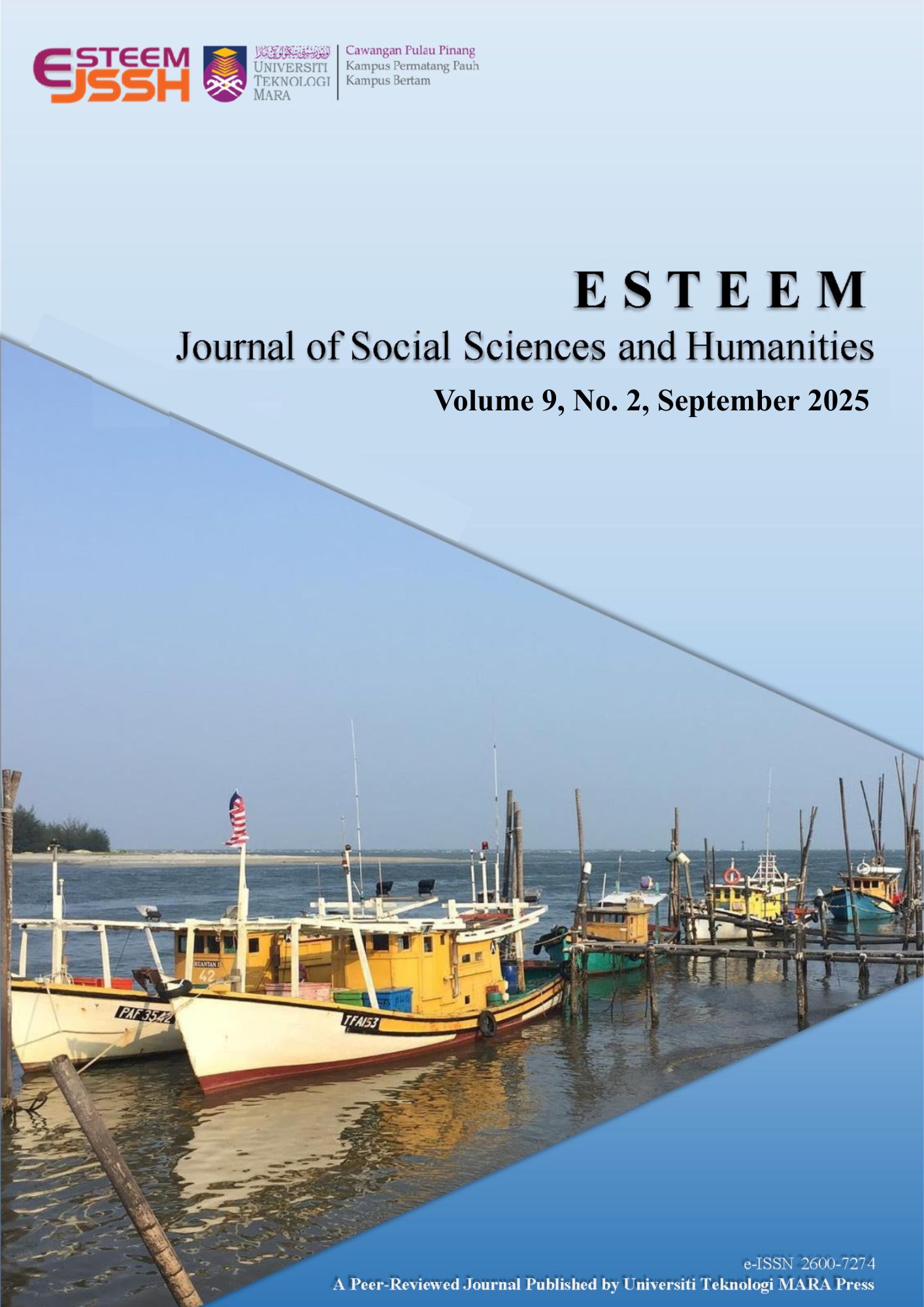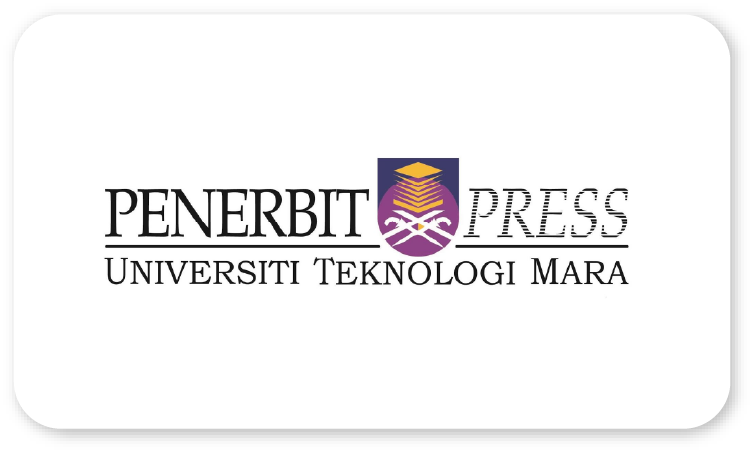
Perceptions of Emotional Intelligence in English Language Learning Among Undergraduates
Nik Mastura Nik Ismail Azlan
Academy of Language Studies, Universiti Teknologi MARA (UiTM) 40450 Shah Alam, Selangor Darul Ehsan Malaysia
Salwa Othman
Academy of Language Studies, Universiti Teknologi MARA (UiTM) 40450 Shah Alam, Selangor Darul Ehsan Malaysia
Muhammad Aizat bin Azhari
Academy of Language Studies, Universiti Teknologi MARA (UiTM) 40450 Shah Alam, Selangor Darul Ehsan Malaysia
Dianna Suzieanna Mohamad Shah
Academy of Language Studies, Universiti Teknologi MARA (UiTM) 40450 Shah Alam, Selangor Darul Ehsan Malaysia
Abstract
Emotional Intelligence (EI) is the ability to recognise, understand, regulate, and utilise emotions in oneself and in others (Mayer et al., 2004). Studies have investigated emotional intelligence (EI) in the context of foreign language learning, particularly its role in influencing motivation, anxiety, and language acquisition. The purpose of this study was to investigate students’ use of emotional intelligence in the process of learning and using English as a second language. A quantitative study was conducted to explore motivation factors for learning among undergraduates at a public university in Malaysia. A purposive sample of 84 participants responded to the survey. The instrument used a 5-Likert scale survey (ranging from 1 - strongly disagree to 5 - strongly agree) and is rooted in Schutte et al.’s (1998) instrument titled, The Schutte Self-Report Emotional Intelligence Test (SSEIT), which was modified into the Emotional Intelligence in English Learning Self-Report Test (EILLES). The overall high percentages and mean scores of RQ 1 to RQ 4 (perceptions of emotions, managing own emotions, managing others’ emotions, and utilisation of emotions) reveal that learners’ perceptions of emotional intelligence in English language learning are agreeably positive and deemed as useful and necessary. The implication of the study should encourage educators to incorporate EI training into their ESL teaching and learning practices. Suggestions to future researchers are to selectively sample a balanced number of female and male students to increase the reliability and accuracy of results, to target a bigger sample population, and to explore the educators’ perspective on EI in language learning and investigate other factors/sub-scales of EI in language learning.
Keywords: Emotional intelligence (EI), English language learning, Schutte Self-Report Emotional Intelligence Test (SSEIT), Emotional Intelligence in English Language Learning Self-Report Test (EILLES)
DOI:
References:
Abdollahi, A., & Talib, M. (2015). Emotional intelligence moderates perfectionism and test anxiety among Iranian students. School Psychology International, 36(5), 498–512. https://doi.org/10.1177/0143034315603445
Abdollahi, A., Hosseinian, S., Panahipour, H., Najafi, M., & Soheili, F. (2018). Emotional intelligence as a moderator between perfectionism and happiness. School Psychology International, 40(1), 88–103. https://doi.org/10.1177/0143034318807959
Azhari, M. A., Amir, N., Othman, S., Mohandas, E. S., Zamani, N. F., & Rahmat, N. H. (2022). Analysing rhetorical problems in writing. International Journal of Academic Research in Business and Social Sciences, 12(1), 1277–1286. https://doi.org/10.6007/IJARBSS/v12-i1/12059
Balasubramanian, C., & Al‐Mahrooqi, R. (2016). Emotional intelligence in language instruction in Oman: The missing link? RELC Journal, 47(2), 145–160. https://doi.org/10.1177/0033688216645471
Bereded, D. G., Abebe, A. S., & Negasi, R. D. (2025). Emotional intelligence and academic achievement among first-year undergraduate university students: The mediating role of academic engagement. Frontiers in Education, 10, 1567418. https://doi.org/10.3389/feduc.2025.1567418
Chamundeswari, S. (2013). Emotional intelligence and academic achievement among students at the higher secondary level. International Journal of Academic Research in Economics and Management Sciences, 2(4). https://doi.org/10.6007/ijarems/v2-i4/126
Fakaruddin, F. N., & Tharbe, I. H. A. (2018). Self-esteem and emotional intelligence among students in a public higher learning institution in Malaysia. In Proceedings of the Universitas Indonesia International Psychology Symposium for Undergraduate Research (UIPSUR 2017). Advances in Social Science, Education and Humanities Research, 139 (pp. 167–171). Atlantis Press. https://doi.org/10.2991/uipsur-17.2018.36
Fernández‐Martínez, E., Alonso, A., Marqués‐Sánchez, P., Martínez-Fernández, M., Sánchez-Valdeón, L., & Liébana‐Presa, C. (2019). Emotional intelligence, sense of coherence, engagement and coping: A cross-sectional study of university students’ health. Sustainability, 11(24), 6953. https://doi.org/10.3390/su11246953
Ghanadi, Z., & Ketabi, S. (2014). The relationship between emotional intelligence and learners’ beliefs about language learning: Iranian advanced EFL learners in focus. Theory and Practice in Language Studies, 4(3), 518–523. https://doi.org/10.4304/tpls.4.3.518-523
Goleman, D. (1995). Emotional intelligence. Bantam Books.
Hassan, R., & Kamaruddin, N. S. (2023). Emotional intelligence and learner motivation in ESL classrooms: A qualitative approach. ESTEEM Journal of Social Sciences and Humanities, 7(1), 65–75. https://doi.org/10.24191/ejssh.v7i1.21234
Institute for Youth Research Malaysia. (2015). Indeks Belia Malaysia 2015. Institut Penyelidikan Pembangunan Belia Malaysia.
Jackson, S. L. (2015). Research methods and statistics: A critical thinking approach (5th ed.). Cengage Learning.
Journal, A., & Owaidah, A. (2024). Affective factors of emotional intelligence in learning English among Saudi female EFL students. OSF Preprints. https://doi.org/10.31235/osf.io/va4ng
MacCann, C., Jiang, Y., Brown, L. E. R., Double, K. S., Bucich, M., & Minbashian, A. (2023). Emotional intelligence predicts academic performance: A meta-analysis. Psychological Bulletin, 149(2), 150–172. https://doi.org/10.1037/bul0000307
Mayer, J. D., Salovey, P., & Caruso, D. R. (2004). Emotional intelligence: Theory, findings, and implications. Psychological Inquiry, 15(3), 197–215. https://doi.org/10.1207/s15327965pli1503_02
Ojewola, F. (2022). Relationship between emotional intelligence and academic achievement of secondary school students in Ogbomoso Metropolis, Nigeria. Journal of Education and Practice, 13(21), 79–88. https://doi.org/10.7176/jep/13-21-09
Othman, N., & Muda, T. (2018). Emotional intelligence towards entrepreneurial career choice behaviours. Education + Training, 60(9), 953–970. https://doi.org/10.1108/ET-07-2017-0098
Othman, S. (2015). Attitudes and motivations towards learning English as a second language of Rembau MARA Higher Technical College undergraduates (Master’s thesis, Universiti Teknologi MARA). Universiti Teknologi MARA Institutional Repository. https://ir.uitm.edu.my/id/eprint/15599
Othman, S., Rahmat, N. H., Aripin, N., & Sardi, J. (2022). Writers’ beliefs in academic writing. International Journal of Academic Research in Business and Social Sciences, 12(1), 1340–1350. https://doi.org/10.6007/IJARBSS/v12-i1/12345
Oxford, R. L. (1990). Language learning strategies: What every teacher should know. Newbury House.
Öz, H., Demirezen, M., & Pourfeiz, J. (2015). Emotional intelligence and attitudes towards foreign language learning: Pursuit of relevance and implications. Procedia - Social and Behavioral Sciences, 186, 416–423. https://doi.org/10.1016/j.sbspro.2015.04.118
Pishghadam, R., Zabetipour, M., & Aminzadeh, A. (2013). Examining the relationship between emotional intelligence and language learning strategies: The case of Iranian EFL learners. Iranian Journal of Applied Language Studies, 5(1), 87–104.
Rahman, N. A., & Azmi, M. N. L. (2021). The role of emotional intelligence in enhancing ESL learners’ reading comprehension. ESTEEM Journal of Social Sciences and Humanities, 5(1), 77–87. https://doi.org/10.24191/ejssh.v5i1.13698
Rahmat, N. H. (2024). Exploring information processing among language learners. International Journal of Academic Research in Business & Social Sciences, 14(2), 1933–1942. https://doi.org/10.6007/IJARBSS/v14-i2/20866
Rahmat, N. H., & Aripin, N. (2021). Metacognitive writing strategies model used by ESL writers in the writing process: A study across gender. International Journal of Asian Social Science, 11(1), 1–9. https://doi.org/10.18488/journal.1.2021.111.1.9
Ramachandran, K., Hamsan, H., & Khir, A. (2020). Indirect relationship of attachment, immediacy, interpersonal needs and interpersonal attraction between emotional intelligence and life satisfaction: An empirical study of Malaysian undergraduates. International Journal of Academic Research in Business and Social Sciences, 10(16), 148–159. https://doi.org/10.6007/ijarbss/v10-i16/8309
Sadig, Z. (2024). Fostering emotional intelligence in language learners. Journal of Applied Language and Educational Studies, 4(1), 106–120. https://doi.org/10.69760/jales.2024.00106
Salovey, P., & Mayer, J. D. (1990). Emotional intelligence. Imagination, Cognition and Personality, 9(3), 185–211. https://doi.org/10.2190/DUGG-P24E-52WK-6CDG
Schutte, N. S., Malouff, J., Hall, L. E., Haggerty, D. J., Cooper, J. T., Golden, C. J. I., & Dornheim, L. (1998). Development and validation of a measure of emotional intelligence. Personality and Individual Differences, 25(2), 167–177. https://doi.org/10.1016/S0191-8869(98)00001-4
Shao, K., Yu, W., & Ji, Z. (2013). An exploration of Chinese EFL students’ emotional intelligence and foreign language anxiety. Modern Language Journal, 97(4), 917–929. https://doi.org/10.1111/j.1540-4781.2013.12042.x
Tee, K., Ahmad, N., Roslan, S., & Hassan, N. (2023). Emotional intelligence, prosocial behaviours, and coping responses in young adults: A conceptual framework for effective emotional regulation. International Journal of Academic Research in Progressive Education and Development, 12(3). https://doi.org/10.6007/ijarped/v12-i3/19097
Tee, K., Ahmad, N., Roslan, S., & Hassan, N. (2024). Improving Malaysian undergraduates’ emotional intelligence skills through emotional intelligence training program. International Journal of Academic Research in Progressive Education and Development, 13(4). https://doi.org/10.6007/ijarped/v13-i4/23208
Tevdovska, E. (2017). The impact of emotional intelligence in the context of language learning and teaching. SEEU Review, 12(1), 125–134. https://doi.org/10.1515/seeur-2017-0009
Thao, D. H., & Nguyen, M. T. (2023). Emotional intelligence and self-regulated learning among Vietnamese university students: An exploratory study. Asian Journal of Language and Education, 3(2), 99–112. https://doi.org/10.1234/ajle.2023.00302
Topal, İ. (2024). The place of emotions in language education from an emotional intelligence perspective. Forum Educational Studies, 2(4), 1832–1845. https://doi.org/10.59400/fes1832
Vistorte, A., Deroncele-Acosta, Á., Ayala, J., Barrasa, Á., López-Granero, C., & Martí-González, M. (2024). Integrating artificial intelligence to assess emotions in learning environments: A systematic literature review. Frontiers in Psychology, 15, 1387089. https://doi.org/10.3389/fpsyg.2024.1387089
Zoghlami, W., Khiari, H., Mnedla, S., & Elloumi, A. (2022). Psychometric properties of the Arabic version of the Schutte Self-Report Emotional Intelligence Test (SSEIT). International Journal of Emergency Mental Health and Human Resilience, 24(4), 51–56.



